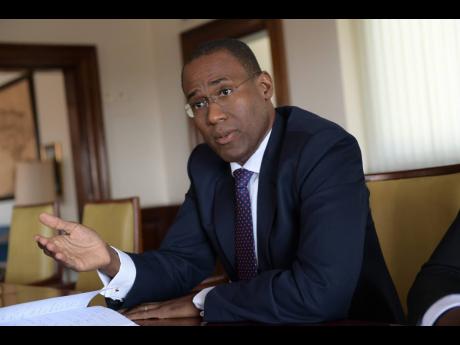Unemployment insurance scheme back on the agenda - PIOJ in charge of feasibility study
Finance and Planning Minister Dr Nigel Clarke has put the Planning Institute of Jamaica (PIOJ) in charge of a feasibility study on unemployment insurance, or UI.
The idea has been tossed around for many years as a safety net for workers who are separated from their jobs through cuts or other changes in fortunes and need short-term support. COVID has given the issue new urgency.
Jamaica still needs to answer the basic question of how the scheme will be paid for and determine whether its benefits outweigh the costs.
Clarke says the feasibility study, which was one of the considerations of the COVID-19 Economic Recovery Task Force that he led, will be done under the auspices of the National Social Protection Committee chaired by the PIOJ.
“This detailed feasibility study is necessary because a reform such as this would have difficulty standing on its own. It would necessarily involve other reforms such as possibly labour-market and social-security reforms,” Clarke told the Financial Gleaner.
The report of the task force tabled in Parliament last week says the terms of reference for the study have already been developed. The plan surrounds development of a contributory scheme.
Long-time proponent of unemployment insurance, Senior Lecturer and Head of the Hugh Shearer Labour Studies Institute Danny Roberts says that had such a scheme been in place, the people who lost their jobs or were laid off during the lockdown to fight the virus, and the country as a whole, would have been better off.
“COVID-19 would have had less of a devastating effect had we, like Barbados, instituted a UI scheme,” said Roberts.
“The recent COVID experience has certainly taught us the importance of protecting employed individuals against the risk of job losses as studies have shown over the last 10 years that preserving the aggregate stock of company-specific human capital makes for a much more robust response to dealing with a crisis,” he said.
The task force report estimates that the number of jobs claimed by the coronavirus lockdown may end up at about 100,000.
Clarke says that Jamaica was able to withstand the shock of the COVID-19 pandemic because of governmental agility. He was referencing the roll-out of Government’s CARES grant – a one-off payment of $10,000 for qualified Jamaicans; and Best Cash – a $9,000-per-fortnight grant to businesses for every employee maintained on the payroll for a three-month period ending July, among other measures.
Those were programmes cobbled together in the moment, with Clarke noting that more permanent solutions were needed.
“For COVID, we had to engage in a rapid response and build an infrastructure that did not exist. While we do that over the short term, we need to work towards more permanent systems over the medium term,” the minister said.
Noted Actuary with Eckler Consultants Constance Hall, who has been calling for various pension and social safety net reforms, says that currently, there is no UI for Jamaica because it is one of those systems that is very expensive to operate.
“The financing of it would require another payroll tax because the only way I see it working is if all the employed people were to put money that goes into a fund or passes through the Consolidated Fund,” Hall said.
She adds that the additional payroll tax has been the impediment to developing the UI scheme all these years.
The finance minister offered a qualified response regarding the issue of how the scheme would be paid for, saying that Jamaica was already bearing the cost in one form or another.
“The question of expense is relative. It has to be measured against where the costs are right now. It is beyond notional that they are embedded somewhere,” Clarke insisted.
Hall agrees, saying that some of those ‘embedded costs’ manifest themselves in Jamaica’s redundancy arrangements.
“We can somewhat comfort ourselves with the fact that we have a very robust redundancy system, which is not really true in those countries where UI exists,” Hall explained, while noting that a UI scheme could result in adjustments to the labour laws around job terminations.
“Jamaica has a fairly generous redundancy payment now, and you really would not want to do both. It would be a matter of whether there is appetite for moving from redundancies,” the actuary said.
“As it is now, if an employer is separating a worker, it is all on them to find the severance funds, but if we were to have a fund which we are all financing, and if the worker is separated, they are paid from a pool,” she said.
Roberts adds that the Marshall Hall-led Labour Market Commission Report of 2016-17 should be a guidepost for comprehensive reform, along with the strengthening of legislation to protect jobs and income.
“Social protection extends into the area of access to proper healthcare and income security, particularly in cases of old age, sickness, invalidity, work injury, maternity, or loss of a main income earner,” he said, noting that as far as protection goes, just about 20 per cent of the workforce is currently covered under a pension scheme.
Jamaica’s labour force was last estimated at 1.37 million in January, while the employed labour force was counted at 1.27 million.
Hall says that any reform must be preceded by improvements to the minimum wage.
“Before we embark on anything, we must look at the minimum wage. I cannot see how we can continue telling people that $7,000 per week is okay and liveable,” she said.
Finance Minister Clarke was non-committal about the time frame for the detailed study of unemployment insurance but said that the usual 12 to 18-month window for completion would be a good target.

